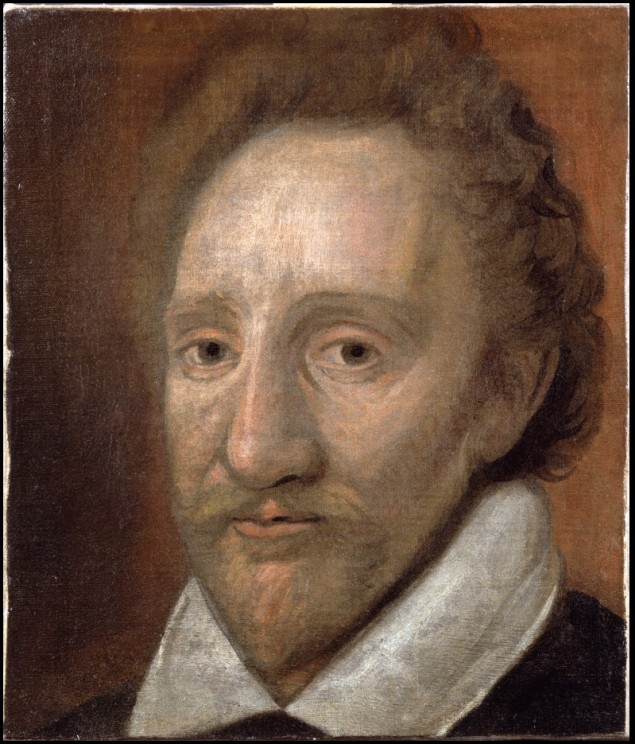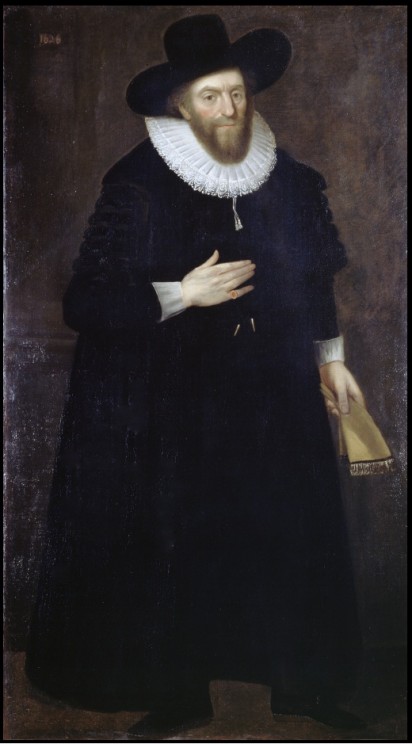By Bart van Es

Richard Burbage © Dulwich Picture Gallery.
It was the first performance of Hamlet around 1601 that projected Burbage into the national imagination. The earliest surviving elegy begins by saying that there will be ‘no more young Hamlet’ after the death of the star:
Oft I have seen him leap into a grave
Suiting the person, which he seemed to have,
Of a sad lover, with so true an eye
That there (I would have sworn) he meant to die.
A 1605 pamphlet notes how the ‘one man’ who plays Hamlet stands at the apogee of his profession, with ‘money’, ‘dignity’, and ‘reputation’ that are destined to earn him a ‘lordship in the country’. The play was ‘diverse times acted by his highness’s servants in the City of London as also in the two universities of Cambridge and Oxford and elsewhere’. It functioned as the calling card of its leading man.
Hamlet proved the making of Burbage, but I suggest that Burbage also had a good deal to do with the way Hamlet was made. Three things about the actor were essential. First, his wealth and playhouse investment. Second, his style of performance. Third, competition with the leading man of a rival company, Edward Alleyn.
Wealth is important because power (just as in modern Hollywood) did not come from talent alone. Before 1599 Burbage had been just one in an acting company of eight equals and his roles in Shakespeare’s plays were commensurate with that stake. But the building of the Globe in 1599 made Richard newly preeminent. He and his brother Cuthbert secured 50% of the venture, with Shakespeare and the four other ‘housekeepers’ having just 10% each. Burbage’s business dominance had immediate implications. Once Burbage was a bigger investor, the company’s playwright wrote him bigger parts. From this point on central characters become more prominent: Henry V, Duke Vincentio, Othello, Lear, Macbeth, Timon, Antony, and Coriolanus (all products of the early Globe years) are not simply longer in their line-counts, they are also grander, more self-defining, roles. Most can be linked with certainty to Burbage and all are very likely to have been played by him. Hamlet (at 1338 lines) is by some measure the largest part in the Shakespeare canon and that statistic connects pretty directly with the actor’s business share.
Of course, Burbage was not just powerful but also gifted. Ben Jonson called him the ‘best actor’ and that reputation was founded, as one elegy put it, on performing ‘so truly to the life’. According to the testimony of Richard Flecknoe:
He was a delightful Proteus, so wholly transforming himself into his part, and putting off himself with his clothes, as he never (not so much as in the tiring house) assumed himself again until the play was done: there being as much difference betwixt him and one of our common actors as between a ballad singer who only mouths it and an excellent singer.
This distance from common actors is vital to Hamlet because it makes possible the Prince’s declaration that ‘forms, moods, shapes of grief’ are merely ‘actions that a man might play’ but that he ‘has that within which passes show’.

Edward Alleyn © Dulwich Picture Gallery.
A final element, though, was the rivalry between Burbage and Alleyn. Exactly like Burbage, Alleyn was an actor who had recently become a big-scale playhouse investor. In 1600 he built the Fortune playhouse to the north of the city, deliberately copying the Globe. To launch his theatre Alleyn revived the roles that had made him famous in the early 1590s: Tamburlaine, Faustus, and other leads in Marlowe plays. Amongst these was Marlowe’s Dido, in which he spoke the following lines:
At last came Pyrrhus, fell and full of ire,
His harness dropping blood, and on his spear
The mangled head of Priam’s youngest son…
In Hamlet (written while Alleyn conducted these revivals) the Prince meets a player and requests an old speech that has a very similar ring:
The rugged Pyrrhus like th’ Hyrcanian beast…
—’Tis not so. It begins with Pyrrhus.
The rugged Pyrrhus, he whose sable arms,
Black as his purpose, did the night resemble…
Burbage, at the Globe, was pretending awkwardly to remember lines that closely resembled those of his rival on the other side of the Thames. The unpopularity of the ‘tragedians of the city’ (which has forced the player to travel to Elsinore) thus becomes a very local affair.
The player’s long speech (which ‘pleased not the million’ and bores Polonius) is partly a dig at Alleyn, but it is also something more complex. Hamlet admires the old player and behind this there is surely also admiration for Alleyn, with whom Burbage had learned his craft as a travelling actor a decade before. His character’s inability to ‘drown the stage with tears, / And cleave the general ear with horrid speech’ is an expression of limitation. But it also announces a new kind of acting in which the feelings of characters are not so easily known. Alleyn had starred as Cutlack the Dane with eyes of ‘lightning’ and words of ‘thunder’; Burbage would command the stage in a different way. ‘To be or not to be’ was a question of acting method. The performer whose death Thomas Middleton would describe as an ‘eclipse of playing’ had an artistic vision of his own.
Bart van Es is Lecturer in English at the University of Oxford and a Fellow of St Catherine’s College. He has previously written books on Edmund Spenser and has a special interest in the writing of history in the Renaissance. Shakespeare in Company is his first work on drama and was supported by the award of an AHRC Fellowship.
Subscribe to the OUPblog via email or RSS.
Subscribe to only literature articles on the OUPblog via email or RSS.
Image credit: Portraits of Richard Burbage and Edward Alleyn used with permission of Dulwich Picture Gallery. All rights reserved.
The post Richard Burbage: Shakespeare’s first Hamlet appeared first on OUPblog.


